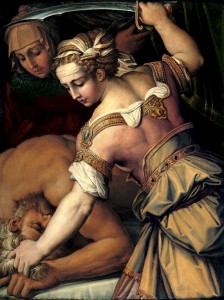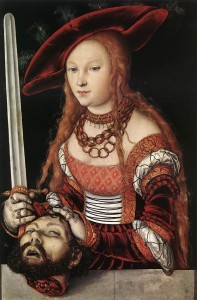As I recently noted, the book of Judith is not part of the Hebrew Tanakh or of Protestant Bibles, but it is recognized as canonical in other churches, especially the Catholic and Orthodox.
I do understand the reasons why Protestants made the decision they did to relegate the book to the Apocrypha, although its subsequent disappearance from the Bible as such is unfortunate. Judith does repay reading, not least for the theme of the weak overthrowing the arrogant and seemingly invincible:
Behold their pride, and send thy wrath upon their heads; give to me, a widow, the strength to do what I plan. By the deceit of my lips, strike down the slave with the prince and the prince with his servant; crush their arrogance by the hand of a woman (9: 9-10).
The writer does take a little too much relish in the specific details of her assassination of the Assyrian oppressor, although these words have for centuries inspired artists with a taste for the gruesome:
She went up to the post at the end of the bed, above Holofernes’ head, and took down his sword that hung there. She came close to his bed and took hold of the hair of his head, and said, “Give me strength this day, O Lord God of Israel!” And she struck his neck twice with all her might, and severed his head from his body. Then she tumbled his body off the bed and pulled down the canopy from the posts; after a moment she went out, and gave Holofernes’ head to her maid, who placed it in her food bag. (13: 6-10).
Early church fathers quoted Judith as canonical. See for instance the First Epistle of Clement, 55 (probably from the early second century):
Many women, being strengthened through the grace of God, have performed many manly deeds. The blessed Judith, when the city was beleaguered, asked of the elders that she might be suffered to go forth into the camp of the aliens. So she exposed herself to peril and went forth for love of her country and of her people which were beleaguered; and the Lord delivered Holofernes into the hand of a woman.
Origen and Tertullian agreed.
I hope this does not sound too cynical, but I think that if discussions over the book’s canonicity were held today, it would stand a far better chance of inclusion. It would take a brave set of (male) church leaders to vote against a book centered so firmly on a powerful female leader, who scorns Israel’s enemies by declaring that “the Lord Almighty has foiled them by the hand of a woman” (16.6).



















